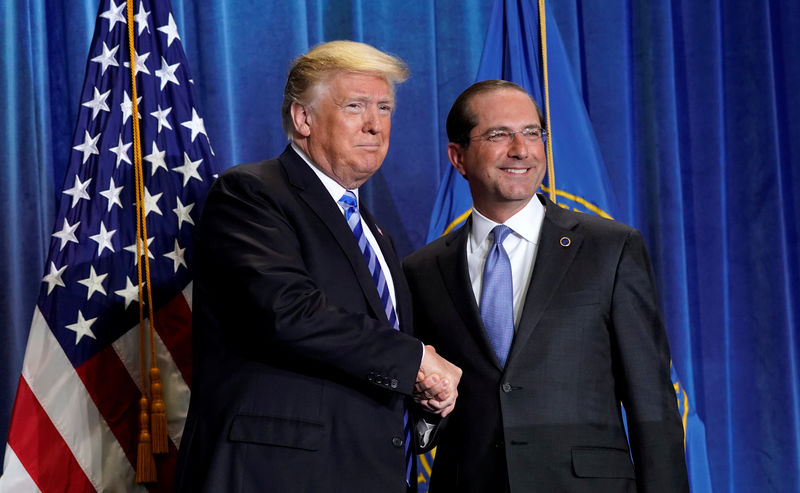By Ginger Gibson and James Oliphant
WASHINGTON (Reuters) - U.S. President Donald Trump's campaign believes he can turn Republicans' biggest liability from last year's congressional elections - the debate about the future of healthcare in America - into a winning issue for his reelection.
That would have appeared highly unlikely just months ago, when Democrats seized upon the issue of coverage for pre-existing medical conditions to capture control of the U.S. House of Representatives.
Since then, the 2020 Democratic presidential field has been locked in a debate about how far to go to transform the U.S. healthcare system. Some candidates have suggested abolishing private insurance in favor of a single government-run plan, sometimes referred to as "Medicare for All," while others favor more modest reforms.
Trump's campaign is betting that whoever emerges with the Democratic nomination next year will have been forced to embrace a sweeping healthcare reform proposal that may spook moderate voters.
"The president has taken the issue back," Tim Murtaugh, Trump's campaign communications director, told Reuters in an interview. "(Democrats are) taking the Blue Cross (private insurance) card out of your wallet and making it worthless."
About half of the dozen top-tier of Democratic hopefuls vying for the nomination have endorsed some form of Medicare for All, according to a Reuters analysis of campaign positions.
Democrats could end up ceding political ground if they nominate a candidate who advocates for universal healthcare, said Drew Altman, president of the Kaiser Family Foundation, a non-partisan healthcare advocacy group.
"The polls show very clearly that the Democrats have a very substantial advantage on health and all the health issues," Altman said. "If the Democrat is a candidate who is a big advocate for Medicare for All, it will play a little differently."
Some voters will be leery of losing their private insurance, but Democrats are still likely to win over those concerned about pre-existing conditions and abortion access, Altman said.
TOUTING REFORMS
Trump has yet to set forth his long-promised healthcare reform plan.
But he is speaking about healthcare more frequently. At a rally in Pennsylvania on Monday, Trump repeated his promise to keep protections for people with pre-existing conditions.
He also is likely to tout what the White House and his campaign say are meaningful changes the administration has made to help small businesses and to try to reduce the price of prescription drugs for U.S. consumers. His administration recently mandated pharmaceutical companies include list prices of drugs in television ads in a bid to get them to lower prices.
His administration argued in a report released in February that it has made healthcare markets more efficient by de-regulating some aspects of the Affordable Care Act, also known as Obamacare.
Those included doing away with the law's mandate to purchase health insurance and expanding coverage options through association plans, which allow small businesses to band together to purchase insurance.
"The president can point to real results on healthcare," Murtaugh said.
But Trump also has provided Democrats with fodder they are likely to use to challenge his healthcare claims, and they are sure to argue that Trump will cost millions of Americans their coverage.
The president already backed a proposal in Congress that would have reduced protections for pre-existing conditions - despite his continued insistence that he does not want to eliminate those rules. And he has proposed reductions to Medicaid and Medicare funding.
His campaign will be forced to navigate those decisions as well as dispel voters' worry that Trump wants to gut the existing Obamacare framework with no effective replacement.
Trump said in a local media interview in Pennsylvania this week he would roll out a new healthcare plan soon. The White House did not respond to a request for comment on the timing.
Providing such a plan will be critical to winning over voters next year, said Michael Steel, a former top aide to former Republican House Speaker John Boehner.
Steel said that while he thinks Democrats are "overreaching" on the issue, "we'll need our own conservative cost-containment plan to truly go on offense. And we don't have that yet."
WORRIED VOTERS
Chris Kofinis, a Democratic strategist and former chief of staff to Senator Joe Manchin, a moderate from West Virginia, said Trump's campaign underestimates the depth of voter anxiety over healthcare costs and coverage.
Branding Democratic proposals as "socialist" will not be persuasive, he said.
"They're wrong if they think they can win this as an ideological debate," Kofinis said, adding that his own work with voter groups has shown some appetite for a large-scale overhaul of the U.S. healthcare system.
Kofinis warned that Democrats risk losing their edge on the issue, however, if they fail to heed the lesson of the 2018 midterm elections and instead become preoccupied with investigations of Trump.
Last year, Democrats took 40 seats to regain the House, a victory largely fueled by voter concerns over losing coverage if Republicans dismantled Obamacare.
Murtaugh believes that Democrats did not act quickly enough to turn their electoral victories into action.

"The big conversation was about healthcare and what are they talking about? Impeachment," Murtaugh said. "They won the election, but they haven't done a damn thing with it."